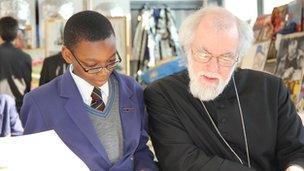Church of England reaffirms its commitment to education
- Published

The Archbishop of Canterbury, Dr Rowan Williams, says Church schools serve their communities
The Church of England has said it expects to create 200 more schools over the next five years, as it set out its vision for its role in education.
In a new report, the Church says its schools must maintain their distinctive Christian character in an increasingly fragmented education system.
Church schools must stand firm amid attacks from secular groups against faith-based schooling, the report adds.
The National Secular Society said religion was for the home, not school.
The Church of England (CofE) is responsible for more than 4,800 primary and secondary schools, educating more than a million pupils.
Looking ahead to the future, the Church says it hopes to create as many as 200 more in the next five years - either new schools or community schools becoming Church schools.
The report - The Church School of the Future - says further work is needed on recruitment and training of Christian teachers and head teachers for CofE schools.
And clergy training and appointments "must include an understanding of the role of Church schools in the Church's mission".
The report also notes the challenges facing religious education, and says the government's response has been "disappointing".
"The exclusion of religious education from the new English Baccalaureate is having a more than symbolic effect on its provision within GCSE options and thereby on numbers of students taking the full-course GCSE," it says.
The report says work is under way to develop a new resource for teaching Christianity in CofE schools.
Serving communities
The Bishop of Oxford, John Pritchard, who chairs the CofE's board of education, said CofE schools were a gift to the nation.
"They have been serving communities for more than 200 years and our schools are very popular with parents," he said.
"But the report is clear that we must be careful to protect their distinctive nature, especially amid pressure from groups who would prefer that we were not involved in education at all."
The Archbishop of Canterbury, Dr Rowan Williams, said: "This report marks the exceptional record of our church schools in the last 200 years and charts the way forward in a fast-changing landscape.
"Universal free education in England began when the Church of England introduced school in every parish - more than 50 years before the provision of state education.
"Two hundred years later, Church schools continue to serve their communities, are popular with parents and they provide an inclusive education with a strong Christian ethos.
"It is important for the nation that we retain their distinctive character, and we are working closely with government to ensure they continue to thrive."
Keith Porteous-Wood, executive director of the National Secular Society, said by putting schools at the centre of its mission, the Church was acknowledging its churches were failing.
"Turning up the volume of religiosity in schools will cause greater resentment among the non-Christian parents at these schools.
"Religion is something for the home and the place of worship."
Church schools were only successful because they kept out the "difficult-to-teach" children, he added.
- Published20 June 2011
- Published22 April 2011
- Published22 April 2011